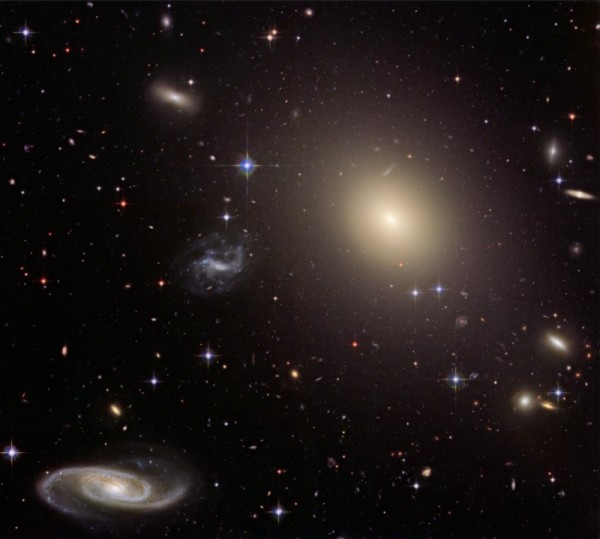“We live in an atmosphere of shame. We are ashamed of everything that is real about us; ashamed of ourselves, of our relatives, of our incomes, of our accents, of our opinions, of our experience, just as we are ashamed of our naked skins.” –George Bernard Shaw
On this Thanksgiving day, we're supposed to express gratitude for all that we have in this world: for the friendships, families, and the bounty of good things that have come our way. We also give thanks for all the serendipity we've been lucky enough to encounter, including what the natural world gives us for free.
 Image credit: public domain photo from https://www.pexels.com/photo/people-field-working-agriculture-6671/.
Image credit: public domain photo from https://www.pexels.com/photo/people-field-working-agriculture-6671/.
Why confine ourselves to such small things to be thankful for? Why not embrace the entire Universe, the laws of nature, and the random, chance events that unfolded to bring us to the moment we get to enjoy right now?


Great article and love reading your articles..thumbs up for the effort in helping us understand the universe !!
I noticed a typo in the link - http://evogeneao.com/ it should be http://www.evogeneao.com/
Very nice article. Here's an excerpt from a 1958 edition of a Catholic Encyclopedia that speaks from priest/philosopher's perspective on this same subject that I find insightful. I hope you don't mind. If not, delete is your friend. In the excerpt below, the author is responding to astronomer Pierre Rousseau's comment during that time in which Pierre stated: “One must be the victim of incurable anthropocentrism to believe that the slightest importance attaches to the race of thinking microbes inhabiting an imperceptible globe revolving round this sun” The author answers this view as follows:
“Theology in her turn will reply: One must be the victim of an excessive concern for quantity to disregard so completely the supreme importance of quality. Granted that man is no more than a “thinking microbe”, a circumstance which confers upon him not equality to, but superiority over, the entire material universe, whatever size it may be. In fact, a false problem is created by the attempt to discredit thought on account of the small space occupied in the universe by the material organism which is its vehicle……..
Indeed, it we imagine an astronomer at the eye-piece of the giant Mount Palomar telescope, it might well be asked whether the greater marvel is to be found at the eye-piece or the aperture end of the telescope.
Our contention is that it will be found at the eye-piece end. The “thinking microbe” who stands at an instrument which is the product of a wealth of scientific research and technique and of a vast expenditure of capital and human labour, the astronomer whose enormously extended range of vision plumbs the furthest reaches of space, is to our eyes a more astonishing spectacle than the huge agglomerations of atoms making up the nebulae, each one of which is but a replica of the others. We know but little about these nebulae. In particular, we do not know whether each galaxy trails, like our own sun, at least one planet inhabited by beings akin to ourselves. In this field any supposition is permissible and none is contradicted by theology. But the enormous extent of the space occupied by the stars, and the terrifying distances at which they are situated, are powerless to induce us to abandon our conviction that divine grace is superior to human nature, and that human nature with its endowment of intelligence and freedom is superior to mere matter.
In short, none of all this presents any problem. We are impressed neither by “astronomical” figures nor by the thousands of millions of years of the life of the universe compared to the few hundreds of thousands of the life of mankind. The appearance of man was a greater event than anything that has since happened on earth; and in the vast setting of the universe, the appearance of a man on the earth was a novelty surpassing all the aggregations of atoms whirling in the midst of the distant galaxies”
Cheers!
Well said (or quoted), Frank!
I am thankful for the glorious cosmos, our intricate world, the interlinked biosphere, and the people that walk in shoes different from mine. It took 14 billion years to get here, and we've only just begun.
"and in the vast setting of the universe, the appearance of a man on the earth was a novelty surpassing all the aggregations of atoms whirling in the midst of the distant galaxies"
Not really. No more than the snowflake that fell on my nose last February then melted from the warmth of my body was a unique and never to be seen again conformation of water molecules in a polyhedral solid lattice.
The appearance of the Tyrannosaurus Rex was a novelty surpassing all the aggregations of atoms whirling in the midst of the distant galaxies". They are no longer here, but what did that do to stop it being unique?
Why the egoist need to be special and important, as if that were the only thing to give life meaning?
"are powerless to induce us to abandon our conviction that divine grace is superior to human nature"
An ASTRONOMICALLY HUGE begging of the question.
There is no divine grace, and the only god in that bible of yours is a monster worse than all the vilest emotions of the human race has EVER managed to place in one single being. Or in any group of such malignant humanity.
I hope you don’t mind. If not, delete is your friend.
"Well said (or quoted), Frank!"
What was that, then, I must have missed it for all that blowhard insistence on a personal imagination of a superior being as being especially taken with the one pronouncing.
Surely you could be thankful for being alive here and now without having to nod your head in subservience to a capricious and vengeful mythological creature?
If any of you think you could know the least thing about an all knowing, all powerful, ever-present deity figure and have a personal relationship with them, you need to watch this.
And don't worry, it's not blasphemous or even dismissive of a god, it's a look at what those features would mean for any non-omnipotent non-omniscient and non-omnipresent being who interacted with them. And how powerless such a thing would have to be:
https://www.youtube.com/watch?v=Dn9ogQuztgg
Dear Wow,
I certainly did not mean to upset anyone with my post. I enjoy reading Ethan's website and since he had a Thanksgiving/Science theme, thought I'd post something from the "Wonder and Awe" perspective. Here's another except from the same book that I hope we would both agree on. Peace:
"Just as philosophy replaced poetry and mythology in explaining the origins of the world and of man, so has science for the last few centuries taken over the quest from philosophy.
Science differs from philosophy in that it is concerned not with the “final causes of things”, but with their proximate and immediate causes. It refuses to go beyond the facts. A scientific fact is a fact of physical observation, a fact registered by the senses and by the innumerable instruments which man has called in to supplement his senses. The facts once observed and registered are subjected when possible to precise verification in the form of experiments. But science ventures beyond the facts in attempting to explain them. This she achieves by first framing hypotheses and then, after verification, giving them the force of laws if their validity as explanation is confirmed. From this it follows that a hypothesis leads on to fresh observations, and is thus a kind of working tool. But a hypothesis aspires to become a scientific law, and becomes one as soon as it has successfully passed the test of experiment which it has itself set in train."
"I certainly did not mean to upset anyone with my post"
You didn't. Any more than I upset you with mine. Probably less, actually.
"thought I’d post something from the “Wonder and Awe” perspective. "
Wonder what the wonder and awe in there was, though, if it wasn't godbothering BS...
"Science differs from philosophy in that it is concerned not with the “final causes of things”, "
Bollocks. What is meant by "final causes of things" that isn't in science but IS in philosophy? What, indeed is the point of THIS quotescreed of yours this time other than to bugger about off topic again?
self-indulgent little creature aren’t you
disgusting
proof:
http://scienceblogs.com/startswithabang/2015/12/17/what-are-quantum-gra…